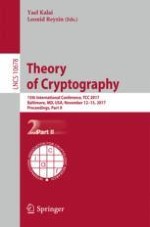2017 | OriginalPaper | Buchkapitel
Inception Makes Non-malleable Codes Stronger
verfasst von : Divesh Aggarwal, Tomasz Kazana, Maciej Obremski
Erschienen in: Theory of Cryptography
Aktivieren Sie unsere intelligente Suche, um passende Fachinhalte oder Patente zu finden.
Wählen Sie Textabschnitte aus um mit Künstlicher Intelligenz passenden Patente zu finden. powered by
Markieren Sie Textabschnitte, um KI-gestützt weitere passende Inhalte zu finden. powered by
